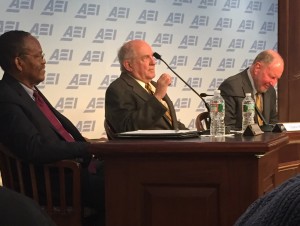I recently attended a discussion at the American Enterprise Institute with Robert Putnam of Harvard University, Charles Murray, who is a W.H. Bradley Scholar at the American Enterprise Institute, and William Julius Wilson, a sociologist and Lewis P. and Linda L. Geyser University Professor at Harvard University. Each speaker presented their criticism of Putnam’s newest book, Our Kids: The American Dream in Crisis, and offered insight into the increasing opportunity gap among children.
Putnam spoke candidly about the segregation deeply embedded in our society—religious, ethnic, and racial disparities have improved, while classist assumptions have led to greater segregation between the lower, middle, and upper social strata. He briefly explored the implications of these tre nds by explaining the terms “summer camp gap” and “Goodnight Moon time” and also called for extensive policy changes to help fix these inconsistencies.
nds by explaining the terms “summer camp gap” and “Goodnight Moon time” and also called for extensive policy changes to help fix these inconsistencies.
The “summer camp gap” refers to the amount of benefits parents are able to provide for their children, such as piano lessons, sports camps, or vacations, and “Goodnight Moon time” is the portion of the day dedicated to parent-child interaction. Children acquire valuable developmental skills during extracurricular activities and from stable, close contact and socialization with a parental figure. Putnam argues, however, that children in high school-educated homes versus college-educated homes possess fewer resources to hone these skills, which further stratifies social classes.
Murray strongly disagreed with Putnam’s approach to policy implementation, and Wilson believed Putnam’s book did not focus nearly enough on interracial differences.
I believe that the discussion centered largely on the social sphere, and the panelists did not integrate education into the conversation as much as they could have. A child’s social environment is inextricably linked to his or her educational access. This connection can either accelerate or hamper a child’s progress in the social milieu.
Education should have been at the forefront of this discussion, rather than a topic mentioned in passing.
Hayley Nicholas, CER Intern

